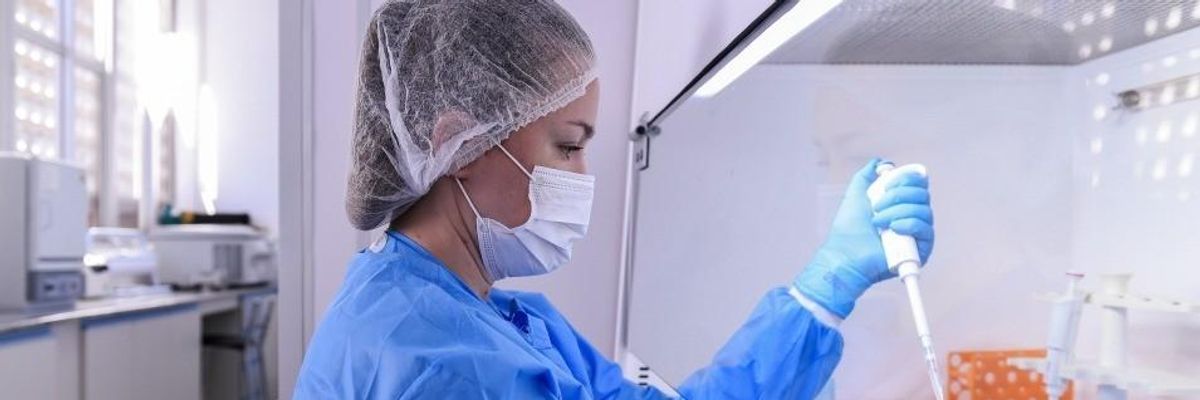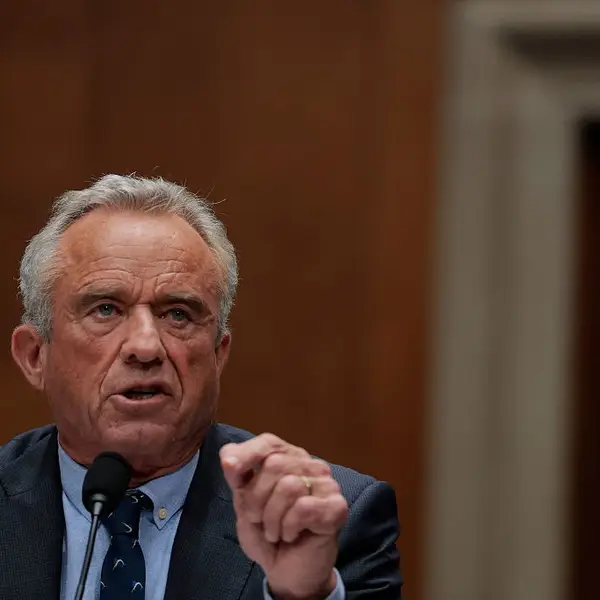
Larissa Vuitika, biologist, works during the virus inactivation process on March 24, 2020 in Belo Horizonte, Brazil. (Photo: Pedro Vilela/Getty Images)
Medical Experts Denounce 'Irresponsible' Rush to Covid-19 Vaccine by Russia
"The collateral damage from release of any vaccine that was less than safe and effective would exacerbate our current problems insurmountably."
International medical experts expressed concern Tuesday after Russian President Vladimir Putin announced that his country registered a vaccine for Covid-19--a pronouncement that came before the drug has completed robust clinical trials.
"A vaccine against coronavirus has been registered for the first time in the world this morning," Putin said on state TV.
The Russian leader further claimed that the vaccine developed by the Moscow-based Gamaleya Institute "works quite effectively" and "has passed all the needed checks."
Multiple news reports and comments from experts in the field raised questions about Putin's claims.
"Russia has released no scientific data on its testing and CNN is unable to verify the vaccine's claimed safety or effectiveness," the outlet reported.
According to Reuters:
The Russian vaccine's approval by the Health Ministry comes before trials that would normally involve thousands of participants, commonly known as a Phase III trial. Such trials are usually considered essential precursors for a vaccine to secure regulatory approval.
Additionally, as the Associated Press reported, injections "were studied in only dozens of people for less than two months," though Russian officials said advanced trials would begin Wednesday. From the wire service:
In the meantime, the vaccine will be offered to tens of thousands of people. Deputy Prime Minister Tatyana Golikova said the vaccination of doctors could start as early as this month. Russian authorities have said that medical workers, teachers, and other risk groups will be the first to undergo vaccination.
Dr. Eric Feigl-Ding, an epidemiologist and senior fellow at the Federation of American Scientists, called Russia's rollout of the vaccine ahead of Stage 3 trials "irresponsible."
In a Twitter thread responding to the Washington Post's reporting on Russia's vaccine announcement, Feigl-Ding explained that "phase 3's larger sample size allows much better study of safety signals and in wider range of patients," adding that waiting for that phase to complete would "allow greater confidence."
But, he added, there are more issues at stake:
Those points were echoed by Dr. Ohid Yaqub, senior lecturer in the Science Policy Research Unit at the University of Sussex.
"In terms of safety," Yaqub said in a statement, "skipping phase 3 means trust in this vaccine--and vaccines generally--could be undermined, and it could also give people a false sense of security, if it turns out the vaccine is not actually effective."
"Another important implication is that, if there is widespread diffusion of this vaccine, it may interfere with the testing of future vaccines that are potentially better," said Yaqub.
Feigl-Ding, in his Twitter thread, also stressed that development of a Covid-19 vaccine should be marked by global cooperation.
"Phase 3 gives not just confidence in safety in wider array of people, and hence picking up effects in more narrow subgroups of people, but also allow well it truly prevents infection in real world setting. And both of those are key. Let's focus: Quality over warp speed," he wrote.
Danny Altmann, Professor of Immunology at Imperial College London, expressed similar skepticism to Russia's announcement, saying in a statement that the "bar is necessarily set very high for criteria that must be satisfied for approval after Phase 3 clinical trials" and warned that the "collateral damage from release of any vaccine that was less than safe and effective would exacerbate our current problems insurmountably."
"I hope these criteria have been followed" with the Russian vaccine, said Altmann. "We are all in this together."
An Urgent Message From Our Co-Founder
Dear Common Dreams reader, The U.S. is on a fast track to authoritarianism like nothing I've ever seen. Meanwhile, corporate news outlets are utterly capitulating to Trump, twisting their coverage to avoid drawing his ire while lining up to stuff cash in his pockets. That's why I believe that Common Dreams is doing the best and most consequential reporting that we've ever done. Our small but mighty team is a progressive reporting powerhouse, covering the news every day that the corporate media never will. Our mission has always been simple: To inform. To inspire. And to ignite change for the common good. Now here's the key piece that I want all our readers to understand: None of this would be possible without your financial support. That's not just some fundraising cliche. It's the absolute and literal truth. We don't accept corporate advertising and never will. We don't have a paywall because we don't think people should be blocked from critical news based on their ability to pay. Everything we do is funded by the donations of readers like you. Will you donate now to help power the nonprofit, independent reporting of Common Dreams? Thank you for being a vital member of our community. Together, we can keep independent journalism alive when it’s needed most. - Craig Brown, Co-founder |
International medical experts expressed concern Tuesday after Russian President Vladimir Putin announced that his country registered a vaccine for Covid-19--a pronouncement that came before the drug has completed robust clinical trials.
"A vaccine against coronavirus has been registered for the first time in the world this morning," Putin said on state TV.
The Russian leader further claimed that the vaccine developed by the Moscow-based Gamaleya Institute "works quite effectively" and "has passed all the needed checks."
Multiple news reports and comments from experts in the field raised questions about Putin's claims.
"Russia has released no scientific data on its testing and CNN is unable to verify the vaccine's claimed safety or effectiveness," the outlet reported.
According to Reuters:
The Russian vaccine's approval by the Health Ministry comes before trials that would normally involve thousands of participants, commonly known as a Phase III trial. Such trials are usually considered essential precursors for a vaccine to secure regulatory approval.
Additionally, as the Associated Press reported, injections "were studied in only dozens of people for less than two months," though Russian officials said advanced trials would begin Wednesday. From the wire service:
In the meantime, the vaccine will be offered to tens of thousands of people. Deputy Prime Minister Tatyana Golikova said the vaccination of doctors could start as early as this month. Russian authorities have said that medical workers, teachers, and other risk groups will be the first to undergo vaccination.
Dr. Eric Feigl-Ding, an epidemiologist and senior fellow at the Federation of American Scientists, called Russia's rollout of the vaccine ahead of Stage 3 trials "irresponsible."
In a Twitter thread responding to the Washington Post's reporting on Russia's vaccine announcement, Feigl-Ding explained that "phase 3's larger sample size allows much better study of safety signals and in wider range of patients," adding that waiting for that phase to complete would "allow greater confidence."
But, he added, there are more issues at stake:
Those points were echoed by Dr. Ohid Yaqub, senior lecturer in the Science Policy Research Unit at the University of Sussex.
"In terms of safety," Yaqub said in a statement, "skipping phase 3 means trust in this vaccine--and vaccines generally--could be undermined, and it could also give people a false sense of security, if it turns out the vaccine is not actually effective."
"Another important implication is that, if there is widespread diffusion of this vaccine, it may interfere with the testing of future vaccines that are potentially better," said Yaqub.
Feigl-Ding, in his Twitter thread, also stressed that development of a Covid-19 vaccine should be marked by global cooperation.
"Phase 3 gives not just confidence in safety in wider array of people, and hence picking up effects in more narrow subgroups of people, but also allow well it truly prevents infection in real world setting. And both of those are key. Let's focus: Quality over warp speed," he wrote.
Danny Altmann, Professor of Immunology at Imperial College London, expressed similar skepticism to Russia's announcement, saying in a statement that the "bar is necessarily set very high for criteria that must be satisfied for approval after Phase 3 clinical trials" and warned that the "collateral damage from release of any vaccine that was less than safe and effective would exacerbate our current problems insurmountably."
"I hope these criteria have been followed" with the Russian vaccine, said Altmann. "We are all in this together."
International medical experts expressed concern Tuesday after Russian President Vladimir Putin announced that his country registered a vaccine for Covid-19--a pronouncement that came before the drug has completed robust clinical trials.
"A vaccine against coronavirus has been registered for the first time in the world this morning," Putin said on state TV.
The Russian leader further claimed that the vaccine developed by the Moscow-based Gamaleya Institute "works quite effectively" and "has passed all the needed checks."
Multiple news reports and comments from experts in the field raised questions about Putin's claims.
"Russia has released no scientific data on its testing and CNN is unable to verify the vaccine's claimed safety or effectiveness," the outlet reported.
According to Reuters:
The Russian vaccine's approval by the Health Ministry comes before trials that would normally involve thousands of participants, commonly known as a Phase III trial. Such trials are usually considered essential precursors for a vaccine to secure regulatory approval.
Additionally, as the Associated Press reported, injections "were studied in only dozens of people for less than two months," though Russian officials said advanced trials would begin Wednesday. From the wire service:
In the meantime, the vaccine will be offered to tens of thousands of people. Deputy Prime Minister Tatyana Golikova said the vaccination of doctors could start as early as this month. Russian authorities have said that medical workers, teachers, and other risk groups will be the first to undergo vaccination.
Dr. Eric Feigl-Ding, an epidemiologist and senior fellow at the Federation of American Scientists, called Russia's rollout of the vaccine ahead of Stage 3 trials "irresponsible."
In a Twitter thread responding to the Washington Post's reporting on Russia's vaccine announcement, Feigl-Ding explained that "phase 3's larger sample size allows much better study of safety signals and in wider range of patients," adding that waiting for that phase to complete would "allow greater confidence."
But, he added, there are more issues at stake:
Those points were echoed by Dr. Ohid Yaqub, senior lecturer in the Science Policy Research Unit at the University of Sussex.
"In terms of safety," Yaqub said in a statement, "skipping phase 3 means trust in this vaccine--and vaccines generally--could be undermined, and it could also give people a false sense of security, if it turns out the vaccine is not actually effective."
"Another important implication is that, if there is widespread diffusion of this vaccine, it may interfere with the testing of future vaccines that are potentially better," said Yaqub.
Feigl-Ding, in his Twitter thread, also stressed that development of a Covid-19 vaccine should be marked by global cooperation.
"Phase 3 gives not just confidence in safety in wider array of people, and hence picking up effects in more narrow subgroups of people, but also allow well it truly prevents infection in real world setting. And both of those are key. Let's focus: Quality over warp speed," he wrote.
Danny Altmann, Professor of Immunology at Imperial College London, expressed similar skepticism to Russia's announcement, saying in a statement that the "bar is necessarily set very high for criteria that must be satisfied for approval after Phase 3 clinical trials" and warned that the "collateral damage from release of any vaccine that was less than safe and effective would exacerbate our current problems insurmountably."
"I hope these criteria have been followed" with the Russian vaccine, said Altmann. "We are all in this together."

